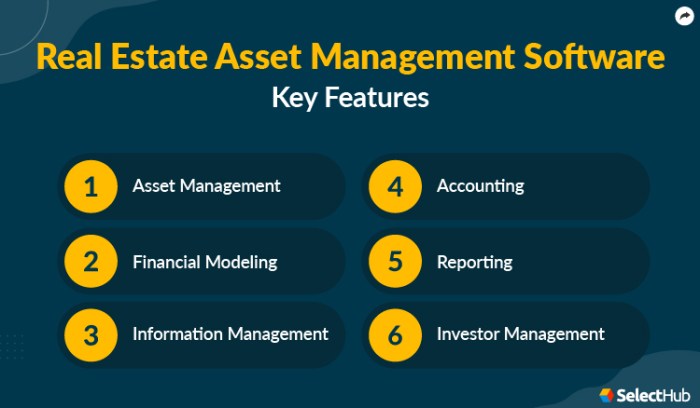Real estate investment is a complex undertaking, requiring meticulous management of various aspects, from property valuations to tenant relations. Effective asset management is crucial for maximizing returns and minimizing risks. Choosing the right software can significantly streamline these processes, enabling investors to focus on strategic decisions. This guide explores the best real estate asset management software, highlighting key features, benefits, and considerations for making an informed decision.

Source: cloudapper.ai
Understanding Real Estate Asset Management Software
Real estate asset management software (REAMS) is designed to centralize and automate various tasks related to property management. These systems typically offer features for property tracking, financial reporting, tenant management, maintenance scheduling, and more. Advanced systems might even incorporate data analytics for informed decision-making. By automating repetitive tasks, REAMS frees up valuable time for real estate investors to focus on higher-level strategies.
Key Features to Consider in REAMS
- Property Management: Includes functionalities for property details, lease agreements, tenant communication, and rent collection.
- Financial Management: Critical for tracking income, expenses, and profitability. Features for budgeting, forecasting, and financial reporting are essential.
- Maintenance Management: Streamlining maintenance requests, scheduling, and tracking work orders is vital for property upkeep.
- Reporting and Analytics: Sophisticated reporting tools provide insights into key performance indicators (KPIs), enabling data-driven decision-making.
- Tenant Relationship Management (TRM): Managing tenant communication, screening, and lease renewals.
- Compliance and Legal Management: Adhering to local regulations and legal requirements is paramount.
- Integrations: The ability to integrate with other business tools like accounting software is a significant advantage.
Top Real Estate Asset Management Software Options
Numerous software solutions cater to different needs and budgets. Choosing the right one depends on factors like the size of the portfolio, specific requirements, and budget constraints. Some prominent players include:
Popular Software Solutions
- Yardi: A robust platform known for its comprehensive features, particularly suitable for larger portfolios.
- AppFolio: A user-friendly option offering a wide range of features, ideal for smaller to medium-sized investors.
- Buildium: Another strong contender with a focus on property management, maintenance, and tenant communication.
- Rent Manager: A versatile solution suitable for property managers seeking a comprehensive platform for all aspects of property management.
Factors to Consider When Choosing Software
Selecting the right real estate asset management software involves careful consideration of several factors:

Source: selecthub.com
Cost and Scalability, Best real estate asset management software
Evaluate the pricing models and consider how the software scales with your growing portfolio.
User Interface and Ease of Use
A user-friendly interface will improve efficiency and reduce the learning curve.
Integration Capabilities
Assess the ability to integrate with existing accounting and CRM systems.
Customer Support and Training
Thorough support and training materials are crucial for effective implementation and ongoing use.
Frequently Asked Questions (FAQ)
- Q: What is the difference between property management software and asset management software?
A: Property management software focuses on the day-to-day operations of individual properties, while asset management software manages a portfolio of properties and offers broader financial and strategic tools.
- Q: How much does real estate asset management software cost?
A: Pricing varies significantly depending on the features, platform, and number of properties managed. Contact vendors directly for detailed pricing information.
- Q: Can real estate asset management software help with investment analysis?
A: Yes, many advanced platforms offer data analysis and reporting features to aid in investment decision-making.
Conclusion and Call to Action
Choosing the right real estate asset management software is a crucial step in optimizing your investment strategy. By considering the key features, software options, and factors mentioned in this guide, you can select a platform that best aligns with your needs and budget. Don’t hesitate to contact potential providers for demos and personalized consultations.
Ready to streamline your real estate investments? Contact us today for a personalized consultation to find the perfect real estate asset management software for your needs.
Quick FAQs: Best Real Estate Asset Management Software
What are the typical costs associated with using real estate asset management software?
Software costs vary significantly depending on the features offered, the number of users, and the chosen subscription model. Some providers offer tiered pricing plans, allowing you to scale your investment according to your needs. It’s essential to evaluate the long-term cost benefits and consider factors such as training and implementation expenses.
How do I choose the right software for my real estate portfolio?
Consider the size and complexity of your portfolio, the specific functionalities you require, and the budget constraints you face. Look for user-friendly interfaces, robust reporting capabilities, and seamless integration with other systems you already use. Thorough research and comparing different software options are crucial steps in this process.
What security measures do these software platforms implement?
Reputable real estate asset management software providers prioritize data security with robust encryption protocols and access controls. Regular updates and security audits ensure protection against potential threats. Look for platforms with certifications and compliance standards that align with your security needs.